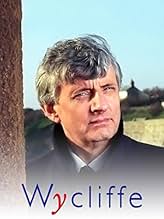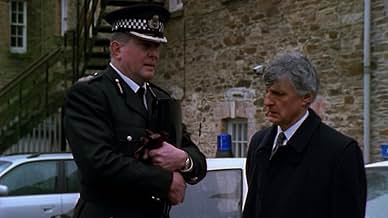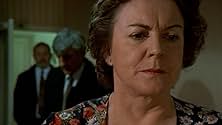Aggiungi una trama nella tua linguaSet in Cornwall, Detective Superintendent Charles Wycliffe, who works along with his colleagues DI Doug Kersey and DI Lucy Lane, investigates murder cases with his trademark determination an... Leggi tuttoSet in Cornwall, Detective Superintendent Charles Wycliffe, who works along with his colleagues DI Doug Kersey and DI Lucy Lane, investigates murder cases with his trademark determination and clinical accuracy.Set in Cornwall, Detective Superintendent Charles Wycliffe, who works along with his colleagues DI Doug Kersey and DI Lucy Lane, investigates murder cases with his trademark determination and clinical accuracy.
Sfoglia gli episodi
Trama
Lo sapevi?
- QuizThe series was cancelled because Jack Shepherd refused to continue in the title role when the producers sacked Jimmy Yuill (Det. Insp. Doug Kersey) for "insurance reasons" after he contracted life-threatening meningitis during filming, and then would not reinstate him even though he made a full recovery. Cast and crew felt betrayed and embittered by the production company's heavy-handed attitude. The character of Doug Kersey was written out of the last two episodes of what became the final series.
- ConnessioniFeatured in Drama Trails: 'Secret Diary of a Call Girl' to 'London's Burning' (2008)
Recensione in evidenza
After binging 20+ seasons of Midsomer Murders, Wycliffe was the perfect show to go into next. Instead of the quirky, usually fun, but for sure brighter, HD widescreen presentation with a much more modern formulaic episode, we get a much more realistic, drawn out portrayal of policing/detective work.
Just wrapping up the last episode of season 5. What's unfortunate is that it had probably at least 2 more seasons in it, and I put all the blame on ITV. Anyway, for my experience, the first three seasons are much different than the last two, and that's not a bad thing. While those first seasons draw more from the Wycliffe books and that same format, season 4 and 5 started having several long reaching arcs that were woven well into the mystery of the week.
One of the things that might throw some people off (but if you've seen Taggart, especially those early years) is that when the case is done, many times the episode just ends on what seems to be an awkward note - still, it doesn't take long to get used to it. Today, we seem to want, or feel that we deserve, some kind of resolution for everyone, even the secondary characters.
An underlying theme of the show that becomes more prominent is certainly the conflict between the "man on the ground" and the bureaucracy calling the shots from their ivory tower, usually concerned more with politics, procedure and press releases than the actual job. This is incarnated typically in Michael Attwell's DCC Stevens, who does a wonderful job of bringing to life a character that makes you want to punch him in the face every time he is onscreen.
It's not until later in the show's run that we start to get better glimpses into the personal lives of Wycliffe, Doug and Lucy, but the common theme of trying to have a life outside of the job is what is emphasized. With Wycliffe, what starts out with just phone calls home to Helen or even one or two with his son David, eventually give way to more nuanced and fleshed out scenes with his entire family, as he struggles constantly with being there as a husband and father to two teenagers. At the same time, Wycliffe also has the benefit of having a fairly stable home life. Doug and Lucy have their own issues just trying to find and maintain any kind of lasting relationships.
The Cornish setting is a nice change,not only from other British cop shows I've watched, but from police dramas/mysteries in general. The rural-ness and for the most part what I'd consider today as low middle class to working poor as many of the supporting characters brings a different kind of gravitas to these stories as the villager or upper crust elites of Midsomer do. There's a certain feeling of despair that seems to be integrated into the personalities of so many characters on the show.
The show takes its time telling the story. There's definitely a slow burn to many episodes. Sometimes an episode will start and it doesn't make much effort to hide whodunit, and other times I was completely surprised. Over the course of its run, Wycliffe finds this odd combination between Columbo (where you know from the start who did it and you watch the heroes struggle through trying to figure out how to prove it) and the typical mystery which when well-written, leaves you guessing right up until the end.
To reference my title, it's certainly a show that wouldn't get the greenlight today. If it did, there would be probably massive changes to the scope and characterization on the show. Probably in regards to Lucy and Doug does that seem most evident. Lucy has some moments during the show where reality hits her hard, and the show doesn't hold back because she is a woman. She is forced to acknowledge that in certain situations she thought she knew more than she actually did, and it gets her into a couple of pretty rough situations because of it. If anything, the writers actually wrote Lucy as a wonderful character who struggled, had a real character arc, learned, and showed vulnerability. In other words, she was actually written as a woman, instead of the current day trend of taking a male character and just changing the pronouns. Jimmy Yuill's Doug would probably have been written off the show after the first season if Twitter was around back then, because some rando on there would have their sensibilities offended or triggered or something. While he and Wycliffe were both of the old school, Doug's struggle with adjusting to the change not only in policy but underlying culture was definitely more prevalent - and unlike Sgt Troy from Midsomer, who seemed to mellow and broaden his viewpoints somewhat over time, Doug Kersey staunchly stuck to his guns and didn't mince words over his displeasure. It's the kind of characterizations we need today in current American TV.
It is certainly a show I'd recommend. I feel like I rambled, but my coffee has worn off and I need to take a nap.
Just wrapping up the last episode of season 5. What's unfortunate is that it had probably at least 2 more seasons in it, and I put all the blame on ITV. Anyway, for my experience, the first three seasons are much different than the last two, and that's not a bad thing. While those first seasons draw more from the Wycliffe books and that same format, season 4 and 5 started having several long reaching arcs that were woven well into the mystery of the week.
One of the things that might throw some people off (but if you've seen Taggart, especially those early years) is that when the case is done, many times the episode just ends on what seems to be an awkward note - still, it doesn't take long to get used to it. Today, we seem to want, or feel that we deserve, some kind of resolution for everyone, even the secondary characters.
An underlying theme of the show that becomes more prominent is certainly the conflict between the "man on the ground" and the bureaucracy calling the shots from their ivory tower, usually concerned more with politics, procedure and press releases than the actual job. This is incarnated typically in Michael Attwell's DCC Stevens, who does a wonderful job of bringing to life a character that makes you want to punch him in the face every time he is onscreen.
It's not until later in the show's run that we start to get better glimpses into the personal lives of Wycliffe, Doug and Lucy, but the common theme of trying to have a life outside of the job is what is emphasized. With Wycliffe, what starts out with just phone calls home to Helen or even one or two with his son David, eventually give way to more nuanced and fleshed out scenes with his entire family, as he struggles constantly with being there as a husband and father to two teenagers. At the same time, Wycliffe also has the benefit of having a fairly stable home life. Doug and Lucy have their own issues just trying to find and maintain any kind of lasting relationships.
The Cornish setting is a nice change,not only from other British cop shows I've watched, but from police dramas/mysteries in general. The rural-ness and for the most part what I'd consider today as low middle class to working poor as many of the supporting characters brings a different kind of gravitas to these stories as the villager or upper crust elites of Midsomer do. There's a certain feeling of despair that seems to be integrated into the personalities of so many characters on the show.
The show takes its time telling the story. There's definitely a slow burn to many episodes. Sometimes an episode will start and it doesn't make much effort to hide whodunit, and other times I was completely surprised. Over the course of its run, Wycliffe finds this odd combination between Columbo (where you know from the start who did it and you watch the heroes struggle through trying to figure out how to prove it) and the typical mystery which when well-written, leaves you guessing right up until the end.
To reference my title, it's certainly a show that wouldn't get the greenlight today. If it did, there would be probably massive changes to the scope and characterization on the show. Probably in regards to Lucy and Doug does that seem most evident. Lucy has some moments during the show where reality hits her hard, and the show doesn't hold back because she is a woman. She is forced to acknowledge that in certain situations she thought she knew more than she actually did, and it gets her into a couple of pretty rough situations because of it. If anything, the writers actually wrote Lucy as a wonderful character who struggled, had a real character arc, learned, and showed vulnerability. In other words, she was actually written as a woman, instead of the current day trend of taking a male character and just changing the pronouns. Jimmy Yuill's Doug would probably have been written off the show after the first season if Twitter was around back then, because some rando on there would have their sensibilities offended or triggered or something. While he and Wycliffe were both of the old school, Doug's struggle with adjusting to the change not only in policy but underlying culture was definitely more prevalent - and unlike Sgt Troy from Midsomer, who seemed to mellow and broaden his viewpoints somewhat over time, Doug Kersey staunchly stuck to his guns and didn't mince words over his displeasure. It's the kind of characterizations we need today in current American TV.
It is certainly a show I'd recommend. I feel like I rambled, but my coffee has worn off and I need to take a nap.
- bmward-83027
- 22 dic 2023
- Permalink
I più visti
Accedi per valutare e creare un elenco di titoli salvati per ottenere consigli personalizzati
- How many seasons does Wycliffe have?Powered by Alexa
Dettagli
- Data di uscita
- Paese di origine
- Lingua
- Celebre anche come
- Уиклифф
- Luoghi delle riprese
- Wheal Uny, Redruth, Cornwall, Inghilterra, Regno Unito(opening titles: Wycliffe stands in front of a derelict tin mine)
- Aziende produttrici
- Vedi altri crediti dell’azienda su IMDbPro
Contribuisci a questa pagina
Suggerisci una modifica o aggiungi i contenuti mancanti






























